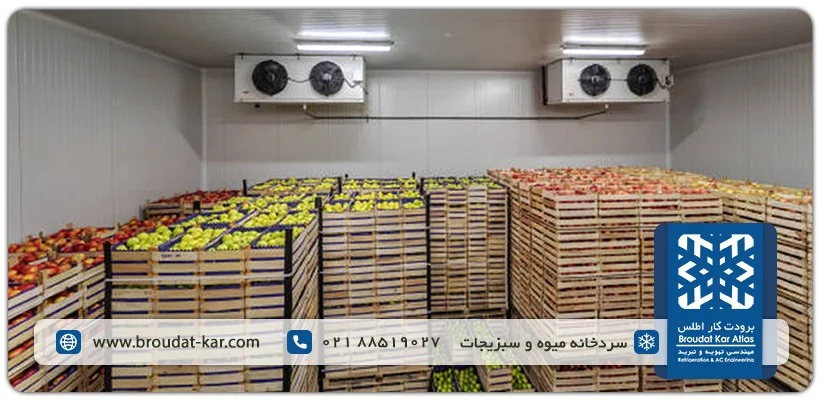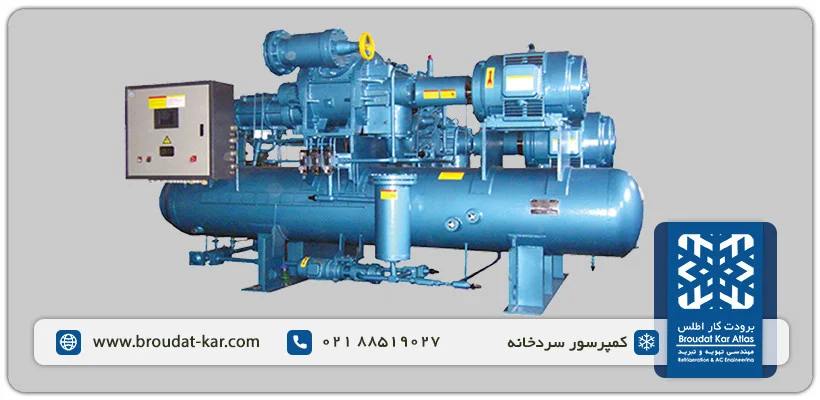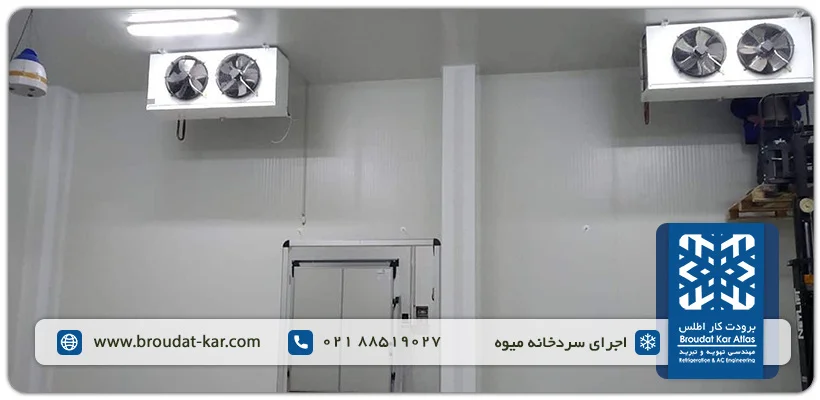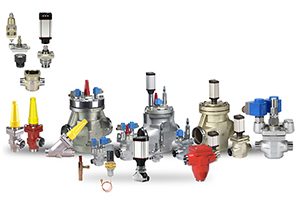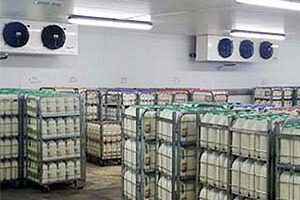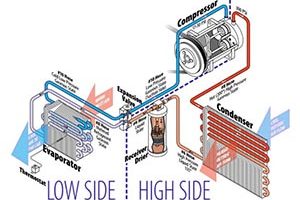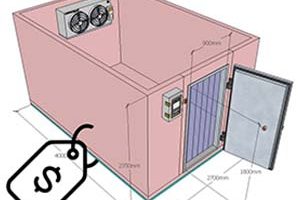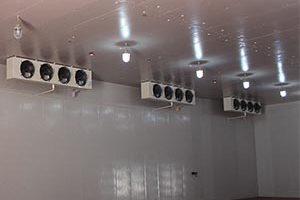What is Fruit Cold Storage?
A Fruit cold storage is a specialized facility designed to store fruits and vegetables in optimal conditions to extend their shelf life and maintain their freshness. Once harvested, fruits are susceptible to spoilage due to internal enzymes and external microorganisms. Fruit cold storage facilities are constructed to slow down and control this process by regulating temperature, humidity, and atmosphere.
By maintaining the right conditions, fruit cold storage facilities help regulate the supply of fruits to the market and enable availability throughout the year, regardless of the harvesting season. This ensures that consumers have access to fresh fruits and vegetables at any time and helps reduce waste in the supply chain.
Technical Specifications of Fruit Cold Storage
The technical specifications of fruit cold storage include the following key points:
– Temperature Range: Fruit cold rooms typically maintain temperatures ranging from +18 degrees Celsius (for banana ripening) to -17 degrees Celsius (for preserving date palm).
– Humidity and Ventilation: Proper humidity levels and ventilation are crucial considerations for fruit storage alongside temperature control.
– Cooling System: Fruit cold storage units can utilize either Freon or ammonia-based cooling systems.
– Capacity: Fruit cold storage facilities are available in a range of capacities, from 5 tons to 50,000 tons, catering to various storage needs.
– Insulation: Insulation for fruit cold storage generally consists of 10 cm polyurethane sandwich panels with a density of 40 kg/m3 and colored galvanized sheeting on both sides.
– Humidity Control: Humidity levels within the fruit cold room are adjusted and regulated based on the specific requirements of the fruits stored.
While these are general specifications, the storage conditions for different fruits and vegetables may vary based on their unique requirements. Each type of product stored in fruit cold storage adheres to its own set of standards and conditions to ensure optimal preservation and quality maintenance.
Optimal Storage Conditions and Shelf Life for Various Fruits and Vegetables in Cold Storage
The table below outlines the recommended storage temperature, relative humidity, and maximum storage duration for different fruits and vegetables in cold storage. These temperature details extracted from reputable sources like the ASHRAE HANDBOOK REFRIGERATION 2014, it’s crucial to understand the nature of the fruit you plan to store before investing in or constructing a fruit cold storage facility.
Table of Storage Conditions for Various Fruits and Vegetables in Cold Storage
| Row | Product Type | Storage Temperature (in degrees Celsius) | Relative Humidity (Percentage) | Approximate Postharvest Life |
| 1 | Fennel | 0-2 | 90-95 | |
| 2 | Apple | 4to-1 | 90-95 | 12Months |
| 3 | Apricot | 0 | 90-95 | 1Month |
| 4 | artichoke | 0 | 95-100 | |
| 5 | Asparagus | 2/5 | 95-100 | |
| 6 | Avocado | 12 | 85-90 | |
| 7 | Banana | 12to15 | 90-95 | 1Month |
| 8 | Green Beans | 4to7 | 95 | 10Days |
| 9 | Beans | 0 | 90-95 | 10Days |
| 10 | Beet | 0 | 98-100 | 5Months |
| 11 | Black Berry | 0to-0.5 | 90-95 | 3Days |
| 12 | BlueBerries | 0to-0.5 | 90-95 | |
| 13 | Black Berry | 0to-0.5 | 90-95 | 3Days |
| 14 | Raspberry | 0to-0.5 | 90-95 | 3Days |
| 15 | Broccoli | 0 | 95-100 | 15Days |
| 16 | Lettuce | 0 | 95-100 | 3Weeks |
| 17 | Carrot | 0 | 98-100 | 2Weeks |
| 18 | Cauliflower | 0 | 95-98 | 1Month |
| 19 | Celery | 0 | 98-100 | 3Months |
| 20 | Cherry | 0 | 90-95 | 3Weeks |
| 21 | Chives | 0 | 95-100 | |
| 22 | Cilantro | 0to2 | 95-100 | |
| 23 | Grapefruit | 14to15 | 85-90 | 1Year |
| 24 | Lemon | 10to12 | 85-90 | 3Weeks |
| 25 | Sour Lemon | 8to10 | 85-90 | 3Weeks |
| 26 | Orange | 0to4 | 85-90 | 4Weeks |
| 27 | Blood Orange | 4to7 | 90-95 | 2Weeks |
| 28 | Tangerine | 7to10 | 85-95 | 2Months |
| 29 | Coconut | 0to2 | 80-85 | |
| 30 | Corn | 0 | 95-98 | 10Days |
| 31 | Cucumber | 10to12 | 85-90 | 15Days |
| 32 | Raisins | 0 | 90-95 | |
| 33 | Date | 0to-17 | 75 | |
| 34 | Eggplant | 10-12 | 90-95 | 10Days |
| 35 | Garlic | 0 | 65-70 | 7Months |
| 36 | Ginger | 13 | 65 | |
| 37 | Grape | 0to0.5 | 90-95 | 3Months |
| 38 | Basil | 10 | 90 | |
| 39 | Mint | 0 | 95-100 | |
| 40 | Oregano | 0to5 | 90-95 | |
| 41 | Parsley | 0 | 95-100 | 2Months |
| 42 | Thyme | 0 | 90-95 | |
| 43 | Jujube | 2.5to10 | 85-90 | |
| 44 | Mango | 12 | 85-90 | |
| 45 | Cantaloup | 2to5 | 95 | |
| 46 | Mushrooms | 0 | 90 | 5Days |
| 47 | Nectar | 0to-0.5 | 90-95 | 1Month |
| 48 | Okra | 7to10 | 90-95 | 10Days |
| 49 | Olive | 5to10 | 85-90 | |
| 50 | Onion | 0 | 65-70 | 2Months |
| 51 | Peach | 0to-0.5 | 90-95 | 1Month |
| 52 | Peas | 0to1 | 90-98 | |
| 53 | Bell Pepper | 7to10 | 95-98 | 15Days |
| 54 | Persimmon | 0 | 90-95 | 5Weeks |
| 55 | Pineapple | 7to12 | 85-90 | |
| 56 | Plum | 0to-0.5 | 90-95 | 5Weeks |
| 57 | Pomegranate | 5 | 90-95 | 4Weeks |
| 58 | Potato | 4to12 | 95-98 | |
| 59 | Squash | 12.5to15 | 50-70 | 3Months |
| 60 | Quince | 0to-0.5 | 90 | |
| 61 | Barberry | 0to1 | 90 | |
| 62 | Radish | 0 | 95-100 | 2Months |
| 63 | Rhubarb | 0 | 95-100 | 1Month |
| 64 | Persian Shallot | 0to2 | 65-70 | |
| 65 | Spinach | 0 | 95-100 | 15Days |
| 66 | Soft Skin Pumpkin | 7to10 | 95 | 2Weeks |
| 67 | Pumpkin With Thick Skin | 12to15 | 50-70 | 6Months |
| 68 | Tamarind | 2to7 | 90-95 | |
| 69 | Green Tomatoes | 10to12 | 90-95 | 1Month |
| 70 | Ripe Tomatoes | 7to10 | 85-90 | 10Days |
| 71 | Hazelnut | 0to2 | 85-90 | |
| 72 | Watermelon | 10to15 | 90 | 2Weeks |
| 73 | Strawberry | 0 | 90-95 | 1Weeks |
| 74 | Kiwi | 0 | 90-95 |
In addition to the three parameters mentioned above, several other factors influence the quality of produce in fruit cold storage. Adhering to standard procedures outlined by authoritative sources is essential for optimal storage. Here are some key considerations:
– Strong-smelling products like onions, garlic, and leeks should be stored separately in packaging. Onions, for instance, require darkness, and keeping their necks dry prevents them from turning green.
– Fruits sensitive to ethylene shouldn’t be stored near ethylene-producing fruits, as it can alter texture, taste, or accelerate ripening.
– Some fruits, like oranges, require increased humidity in cold storage, which can promote mold growth. UV lamps can help mitigate this issue.
– Adequate ventilation is crucial, especially for fruits like apples.
– Fruits like apples, bananas, and pears are typically harvested unripe to withstand transportation and storage. They undergo ethylene treatment to ripen before reaching the market.
When constructing fruit cold store, it’s vital to consider the unique storage conditions for each fruit type to ensure optimal preservation.
Optimizing Atmospheric Conditions in Fruit Cold Storage
Fruits, like all living organisms, respire by taking in oxygen and releasing carbon dioxide. Once harvested, fruits rely on their existing nutrients and the oxygen provided to them. However, if oxygen levels plummet below 2%, it triggers fermentation, converting fruit sugars into alcohol. Moreover, elevated carbon dioxide levels exceeding 5% hasten decay and spoilage, imparting an unpleasant taste to the fruit.
Proper ventilation is essential in fruit cold storage facilities to maintain optimal atmospheric conditions. Adequate airflow helps regulate oxygen and carbon dioxide levels, preventing fermentation and decay, and preserving fruit freshness.
For comprehensive guidance on storing products in fruit cold storage and obtaining an accurate price estimate for your specific requirements, please don’t hesitate to reach out to us.
Essential Equipment for Fruit Cold Storage
Fruit and vegetable cold storage facilities require specific equipment to maintain precise temperature, humidity, and hygiene levels. The cost of such storage solutions varies depending on the type and quality of the equipment employed. Below, we outline the primary equipment used in cold storage and provide brief descriptions of each:
Fruit Cold Storage Insulation
Insulation is crucial for maintaining the desired temperature and humidity levels within the fruit cold storage.
– Polyurethane materials are commonly used for insulation due to their effectiveness.
– Walls and roofs are constructed using polyurethane sandwich panels of appropriate thickness, while injected polyurethane foam insulates the cold pipes.
Fruit Cold Storage Compressor
Compressors are responsible for circulating refrigerant throughout the system.
– Hermetic compressors are suitable for smaller fruit refrigerators, while larger cold stores utilize semi-hermetic or open-type ammonia and freon compressors.
– Open-type ammonia piston or screw compressors are recommended for industrial-scale fruit cold storage facility.
Fruit Cold Storage Condenser
The selection of the condenser depends on factors like the refrigerant used, geographic location, and desired temperature. Common types include air-cooled, water-cooled, and evaporative condensers.
Fruit Cold Storage Evaporator
Evaporators are blowing units designed to absorb heat from the fruits and counteract hot air infiltration.
– Material options for evaporators include galvanized, stainless steel, or aluminum.
– Design considerations include cold room temperature, optimal fin spacing, required airflow, and defrost system efficiency.
Fruit Cold Storage Humidifier
Industrial humidifiers with ultrasonic technology are preferred for maintaining cold humidity levels in fruit storage. These humidifiers convert water into fine mist particles to prevent water droplet formation on the produce while providing necessary moisture.
Selecting the appropriate equipment and ensuring proper installation are critical steps in establishing effective fruit and vegetable cold storage facilities. At Atlas Refrigeration Company, our experienced engineers specialize in designing and implementing solutions tailored to meet your specific requirements.
Atlas Refrigeration Company Services for Fruit Cold Storage
Fruit Cold Storage Design
Our expert team at Atlas Refrigeration Company offers comprehensive design services tailored to your specific fruit cold storage needs. Based on factors such as product type and environmental conditions, we provide optimal cold room system designs to facilitate informed decision-making and efficient construction.
For large-scale industrial projects exceeding 2,000 tons, we prepare detailed documentation and blueprints before initiating construction. Precise engineering and design significantly reduce initial investment costs and ensure seamless operation of your fruit cold storage facility.
Construction of Fruit Cold Storage
Following the design phase, Atlas Refrigeration Company constructs fruit cold storage systems using state-of-the-art machinery and skilled personnel. All equipment undergoes rigorous quality control measures and adheres to international refrigeration standards.
Quality construction of fruit cold rooms relies on expertise across various engineering disciplines including mechanics, electrical systems, automation, and metallurgy. With our extensive experience and global presence, we equip and install cold storage facilities tailored to your fruit storage requirements.
Installation and Operation of Fruit Cold Storage
Our specialized installation and commissioning services ensure proper setup and operation of fruit cold storage systems.
Our installation process includes:
– Insulating and air sealing
– Main equipment setup (compressors, evaporators, condensers)
– Piping and cabling implementations
– Mechanical and electrical testing
– Refrigerant gas charging and compressor oil setup
– Mechanical and electrical adjustments
– Client training on operation and maintenance
Utilizing advanced testing and measurement tools, we meticulously clean pipes and vacuum systems before refrigerant charging and startup.
Warranty and After-Sales Service
We prioritize customer satisfaction and offer a one-year warranty and 15-year after-sales service for our fruit cold storage units. Our dedicated experts promptly address technical issues to ensure uninterrupted operation of your facility.
Free Consultation
The experienced professionals at Atlas Refrigeration Company provide complimentary consultation services to help you make informed decisions about your fruit cold storage needs. Contact us today for expert guidance and support tailored to your requirements.
Conclusion on Fruit Cold Storage
Building a fruit or vegetable cold room requires careful consideration of the specific storage requirements for each type of product. It is essential to estimate the standard conditions of storage based on factors such as temperature and humidity to ensure optimal preservation of fruits and vegetables.
Atlas Refrigeration Company offers comprehensive support throughout the entire process of fruit and vegetable cold storage. From consulting and designing to equipment selection, manufacturing, installation, and commissioning, we provide expert guidance and assistance tailored to your needs.
Our team ensures that you select the right system and equipment for your fruit cold storage facility, taking into account the unique properties of the fruits and vegetables you intend to store. With our expertise, you can rest assured that your cold storage facility will meet the necessary standards for efficient and reliable operation.
Contact us today to receive advice and estimate the price of your fruit cold storage project. We are committed to delivering high-quality solutions to meet your fruit storage needs effectively.
Related posts
Fruit Cold Storage
What is Industrial Cold store? An industrial cold store is a large-scale facility designed and constructed to preserve and
Refrigeration Equipment and Cold Room Machinery This section provides an overview of the machinery and equipment typically used in constructing
Cold Room Price Estimation – Year 2023 At Atlas Refrigeration, we recognize the pivotal role cold rooms play in diverse
